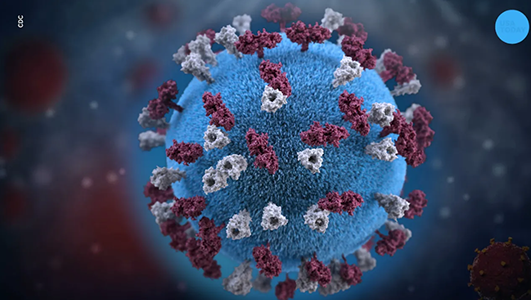||| FROM SAN JUAN COUNTY COMMUNICATIONS |||
Measles has been popping up in the headlines recently, so we’re here to answer your questions and let you know what this might mean for San Juan County residents.
How easy is it to catch measles?
Measles is highly contagious. The virus spreads through coughing and sneezing, and it can survive for up to two hours in a room where someone who is infected has coughed, sneezed, or breathed. If you are not vaccinated or otherwise immune, you have a 90 percent chance of becoming infected if you’re exposed to measles. That means a person with measles can infect 9 out of 10 people around them if they are not protected. Call your healthcare provider immediately if you think you or your child have been exposed to measles!
When do symptoms of measles start?
Symptoms of measles usually appear 7 to 14 days after someone has contact with the virus, but sometimes symptoms can appear up to 21 days after contact. The first symptoms of measles typically include a high fever, cough, runny nose, and red and watery eyes. Two to three days after symptoms begin, tiny white spots may appear inside the mouth. The measles rash appears three to five days after the first symptoms. It usually begins as flat red spots on the face at the hairline and then it spreads to the neck, trunk, arms, legs, and feet. Someone with measles is contagious from four days before to four days after the rash appears. Sometimes immunocompromised patients do not develop the rash.
But is measles really such a big deal?
Measles can be very serious. According to the CDC:
- About 1 in 5 unvaccinated people in the U.S. who get measles will be hospitalized.
- As many as 1 out of every 20 children with measles gets pneumonia, the most common cause of death from measles in young children.
- About 1 in 1,000 children who get measles will develop brain swelling (encephalitis), which can cause permanent damage.
- For every 1,000 children with measles, 1-3 will die from respiratory and neurologic complications, even with good health care.
- If you are pregnant and haven’t received the MMR (measles, mumps, rubella) vaccine, measles may cause premature birth or a low-birth-weight baby.
Measles can be serious to anyone. However, children under 5, adults over 20, pregnant people, and people with weakened immune systems are more likely to suffer from measles complications.
How do I keep myself and my loved ones safe?
Vaccination is your best protection. The most common measles vaccine is a combination of measles, mumps, and rubella (MMR) vaccine. The MMR vaccine protects against measles, mumps, and rubella. Measles vaccinations have been given for decades and are a safe and effective way to protect yourself and others. Two doses of MMR vaccine are approximately 97% effective at preventing measles.
Children should receive two doses of the MMR vaccine, one between 12-15 months old and another between 4 and 6 years old. The vaccine can also be given to older children or adults. You should talk to your medical provider about getting vaccinated if you were not vaccinated as a child.
If you have questions about the MMR vaccine or any other vaccines, we are happy to answer any questions you may have. Call us at 360-378-4474 to speak with one of our public health nurses.
Where can I get my children vaccinated against measles?
Vaccines are provided at no cost to all kids through age 18 in Washington. Call your child’s primary medical provider or visit our HCS website to sign up for an upcoming clinic! Online registration is available for our HCS clinics. If you are unable to schedule online, call our main office to schedule an appointment at 360-378-4474.
How do I know if my child is vaccinated against measles?
Check your family’s immunization status. Parents and guardians can check their child’s immunization status or print their Certificate of Immunization Status at https://myirmobile.com/, or by contacting their medical provider.
How can we avoid an outbreak?
Higher vaccination rates = safer community. In the event of an outbreak, a high vaccination rate (think 95+ out of every 100 people vaccinated against measles) is the best barrier to slow the community spread of disease. Higher vaccination rates help protect not only you, but also those in your community who are unable to be vaccinated, including people with some pre-existing health complications and infants under 1 year old.
How do outbreaks start?
Most local measles cases or outbreaks start with a travel-related illness. While measles is not common in the U.S., it still spreads in many parts of the world. Travelers returning from trips to other countries – or even to other states with active outbreaks – can unintentionally bring measles home with them. Make sure you are current on recommended immunizations before you travel, especially if you’re traveling outside the U.S.
Will Washington have cases soon?
At this time, we do not know if or when the disease will spread. In February of this year, a case of measles was reported in Spokane County. Last week, measles was detected in Oregon. Local public health agencies are working hard to investigate the cases and monitor any close contacts. The sick people and the healthcare facilities where they were treated took proper precautions, so the risk of further exposure is low.
However, islanders who have summer travel plans or are expecting to host out-of-town guests should take extra precautions to keep themselves and their loved-ones safe. Check your child’s vaccine status, catch up on vaccines, and stay home if you’re sick. If you think you might have measles, call your medical provider or speak to one of our public health nurses to discuss next steps. Measles is one of the most contagious diseases, so please don’t just show up at the clinic!
Relevant URLs:
About San Juan County’s Department of Health & Community Services
San Juan County’s Department of Health & Community Services is responsible for community and environmental health, mental health and substance abuse programs, senior services, affordable housing projects, and more. The department has staff and offices on Lopez, Orcas, and San Juan Islands. For more information about San Juan County’s Department of Health & Community Services, visit www.sanjuancountywa.gov/1777/
**If you are reading theOrcasonian for free, thank your fellow islanders. If you would like to support theOrcasonian CLICK HERE to set your modestly-priced, voluntary subscription. Otherwise, no worries; we’re happy to share with you.**







